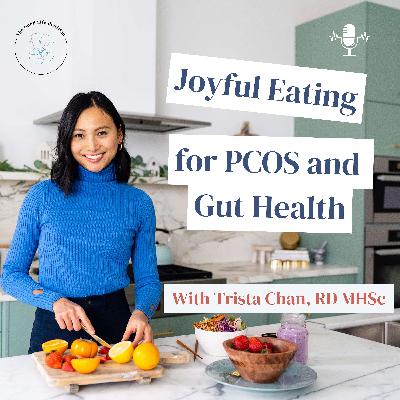What if menopause wasn’t something to “get through,” but a time to reconnect with your body in an entirely new way? In this solo episode for Menopause Month, I’m diving deep into what’s really happening beneath the surface during perimenopause and menopause - and how you can support your body through every change with nourishment and care.We’ll explore how nutrition can protect your bone and heart health, help you maintain muscle mass, and even support brain health during this transition. We’ll also unpack the link between hormones and cognitive function, including what we know about Alzheimer’s risk and how lifestyle can make a difference.What we cover in this episode:Perimenopause + menopause — what’s really happening underneathNourishing your body through this phase: bone, heart, and muscle healthThe brain connection: Alzheimer’s risk + supporting cognitive resilienceWhat to focus on next to feel your best in midlife and beyondWhether you’re just starting to notice changes or already in the thick of it, this episode is here to help you feel informed, empowered, and deeply connected to your body’s evolution. Enjoyed the podcast? Please leave us a rating and review, we'd love to hear it! Links:1-on-1 nutrition programs for menopause: ThegoodlifedietitianServices — Trista Chan RD, MHScMenopause IG series ReferencesAtaei Kachouei A, Singar S, Wood A, Flatt JD, Rosenkranz SK, Rosenkranz RR, Akhavan NS. Cardiovascular Risk Factors, Alzheimer's Disease, and the MIND Diet: A Narrative Review from Molecular Mechanisms to Clinical Outcomes. Nutrients. 2025 Jul 16;17(14):2328. doi: 10.3390/nu17142328. PMID: 40732953; PMCID: PMC12299063. Glenn AJ, Guasch-Ferré M, Malik VS, Kendall CWC, Manson JE, Rimm EB, Willett WC, Sun Q, Jenkins DJA, Hu FB, Sievenpiper JL. Portfolio Diet Score and Risk of Cardiovascular Disease: Findings From 3 Prospective Cohort Studies. Circulation. 2023 Nov 28;148(22):1750-1763. doi: 10.1161/CIRCULATIONAHA.123.065551. Epub 2023 Oct 25. PMID: 37877288; PMCID: PMC10841173. Inaraja V, Thuissard I, Andreu-Vazquez C, Jodar E. Lipid profile changes during the menopausal transition. Menopause. 2020 Jul;27(7):780-787. doi: 10.1097/GME.0000000000001532. PMID: 32187130. Kodete, C. S., Thuraka, B., Pasupuleti, V., & Malisetty, S. (2024). Hormonal Influences on Skeletal Muscle Function in Women across Life Stages: A Systematic Review. Muscles, 3(3), 271-286. Ryczkowska K, Adach W, Janikowski K, Banach M, Bielecka-Dabrowa A. Menopause and women's cardiovascular health: is it really an obvious relationship? Arch Med Sci. 2022 Dec 10;19(2):458-466. doi: 10.5114/aoms/157308. PMID: 37034510; PMCID: PMC10074318.






